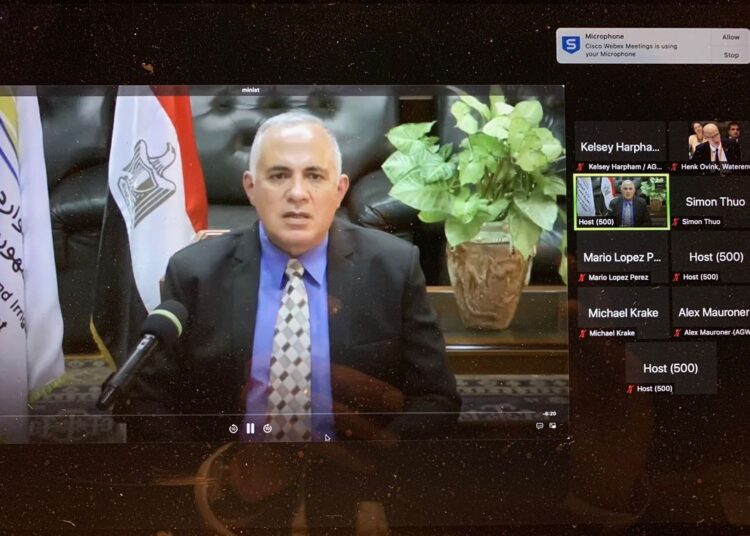Minister of Water Resources and Irrigation Mohamed Abdel Aati on Tuesday took part in a session themed ‘Water, a major axis in climate plans’, on the sidelines of the Cop26 Climate Conference held in Glasgow, United Kingdom.
This came within the framework of the ‘Climate Adaptation Union’ initiative, which the UK launched with Egypt and other countries last January.
Addressing the session, Abdel Aati pointed out that water scarcity represents a major threat to the achievement of development plans, as water is the most important factor affecting the implementation of the sustainable development goals.
Abdel Aati said that Egypt is looking forward to hosting the next Climate Conference 2022 (COP27).
“Water is a key factor in mitigating the impacts of climate change on health, economy and sustainable development,” Abdel Aati said.
He called upon the international community and civil society organisations to unite efforts in a bid to fight the effects of climate change.
Abdel Aati said, “It is undeniable that climate change is already upon us and is already devastating lives and economies.”
On reviewing the water challenges facing Egypt, the minister said the Egyptian government has taken a set of measures to adapt to climate change.
Abdel Aati said that 95 per cent of ministry projects are aimed to adapt and mitigate the effects of climate change.
Egypt is one of those countries most affected by climate change, as large population makes the country extremely vulnerable to its effects.
Moreover, its densely populated Nile Delta is seriously threatened by rising sea levels.
Climate change will also have its impact on citizens’ health, because of the great pressure that it poses not only on water system, but also on a number of different sectors that depend on water — agriculture, food security and energy — in addition to the economic, social and environmental impacts, the minister added.
The potential impacts of climate change in Egypt — brought on by considerable loss of agricultural land and rising temperatures — are hard to ignore, Abdel Aati said. They include reduced crop yields, food insecurity, and water stress, with rising sea levels threatening coastal populations.
Abdel Aati stressed that Egypt is one of the most drought-stricken countries in the world, as annual rainfall is only 1 billion cubic metres.
Egypt depends on the Nile River for 97 per cent of its water needs, he said, adding that the biggest challenge to the water sector is the gap between resources and demand.
Egypt has therefore drawn up the National Water Resources Plan 2037, which will cost of $50 billion to implement and this figure is expected to reach $100 billion in the future.
The strategy involves various projects to attain certain water-security goals by 2050, when the population is forecast to reach 170 million, Abdel Aati said.
The minister called on all countries to draw on the expertise of scientists, businesses, civil society, acting as a forum for developed and developing countries to share knowledge and best practice on local, regional and global solutions to deal with climate change.
He added that it is necessary to take into account the transboundary dimension with regard to adapting to climate changes.
Abdel Aati said that the Ethiopian dam could be a model for regional co-operation if the principles of international law were respected.
He said that Egypt is determined on reaching a fair and binding legal agreement between Egypt, Sudan and Ethiopia on filling and operating the dam in a way that guarantees electricity generation for Ethiopia, protects Sudan from flooding, and ensures water resources for Egypt.






Discussion about this post